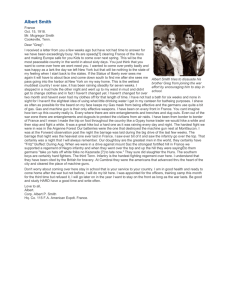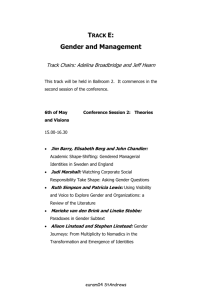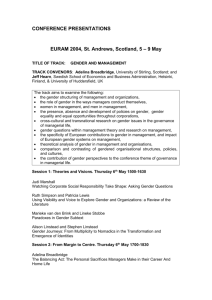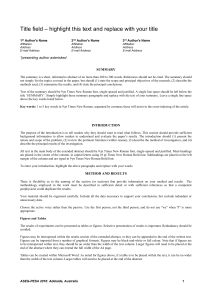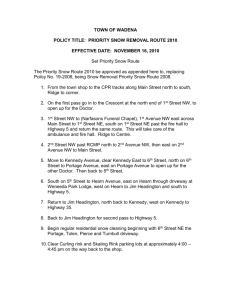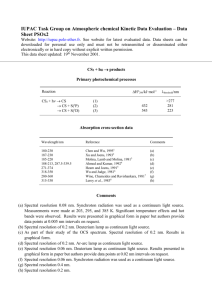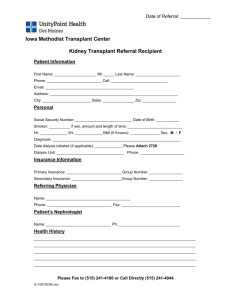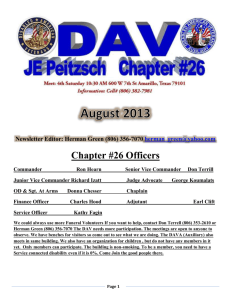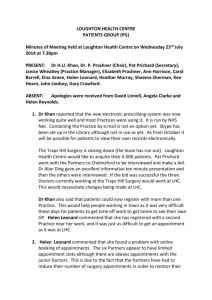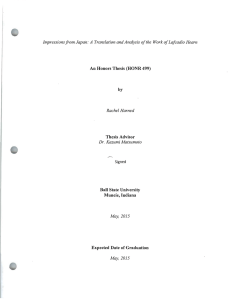Word Doc
advertisement
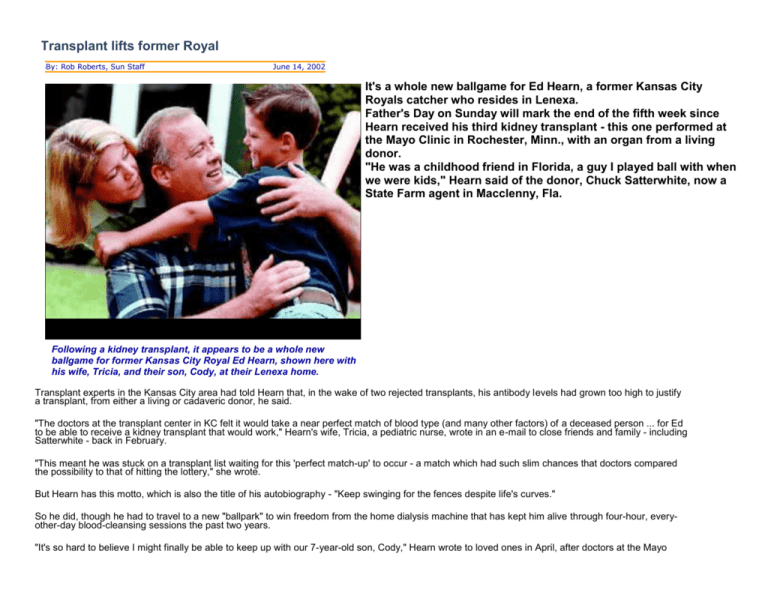
Transplant lifts former Royal BBy: Rob Roberts, Sun Staff June 14, 2002 It's a whole new ballgame for Ed Hearn, a former Kansas City Royals catcher who resides in Lenexa. Father's Day on Sunday will mark the end of the fifth week since Hearn received his third kidney transplant - this one performed at the Mayo Clinic in Rochester, Minn., with an organ from a living donor. "He was a childhood friend in Florida, a guy I played ball with when we were kids," Hearn said of the donor, Chuck Satterwhite, now a State Farm agent in Macclenny, Fla. Following a kidney transplant, it appears to be a whole new ballgame for former Kansas City Royal Ed Hearn, shown here with his wife, Tricia, and their son, Cody, at their Lenexa home. Transplant experts in the Kansas City area had told Hearn that, in the wake of two rejected transplants, his antibody levels had grown too high to justify a transplant, from either a living or cadaveric donor, he said. "The doctors at the transplant center in KC felt it would take a near perfect match of blood type (and many other factors) of a deceased person ... for Ed to be able to receive a kidney transplant that would work," Hearn's wife, Tricia, a pediatric nurse, wrote in an e-mail to close friends and family - including Satterwhite - back in February. "This meant he was stuck on a transplant list waiting for this 'perfect match-up' to occur - a match which had such slim chances that doctors compared the possibility to that of hitting the lottery," she wrote. But Hearn has this motto, which is also the title of his autobiography - "Keep swinging for the fences despite life's curves." So he did, though he had to travel to a new "ballpark" to win freedom from the home dialysis machine that has kept him alive through four-hour, everyother-day blood-cleansing sessions the past two years. "It's so hard to believe I might finally be able to keep up with our 7-year-old son, Cody," Hearn wrote to loved ones in April, after doctors at the Mayo Clinic agreed to perform a transplant and 12 people volunteered to be tested as donors in response to his wife's aforementioned e-mail. Of those 12, Hearn said, five were determined to be adequate matches by the Mayo Clinic, which, because of recent advancements in anti-rejection medications and surgical procedures, puts less emphasis on antibody counts. Satterwhite was ultimately chosen as the donor, Hearn said. And as testament to the fact that giving a kidney isn't such a tough call, he underwent laparoscopic kidney-removal surgery on a Monday, was out of the hospital by Wednesday and back in his Florida office the next Monday. As for Hearn, he's feeling better than he has in a long time and looking forward to returning to his career as a motivational speaker. "You have to get to about a year before you're feeling really good about things," he said of his prognosis. "But every day that goes by is a step in the right direction. And it just seems to me like it's God's plan for me to be back out there on the speaking circuit with more to tell people. There's a destiny behind all this." Hearn, talking over the whir of the dialysis machine during a March 2001 interview, had predicted he "definitely" would overcome, once again, the adversity that has been a theme in his life since being traded to the Royals in 1987. During that interview, Hearn spoke from an office in his basement, where eight years earlier he'd looked down the barrel of a loaded .357 magnum, chambered a bullet and considered ending his life. "Fortunately, there was a knot at the end of the rope that was provided by faith and the girl you just saw down here," he said of his wife, who had just inserted a tube into his arm. "When Tricia and I met in 1986, we were on top of the world," Heard said, referring to his rookie-season ride to a World Series championship with the New York Mets. "And a year later, I was coming to Kansas City, traded for a guy who ... well, you know what he's done since." Hearn was talking about David Cone, the Kansas City native who won 20 games and turned in the second-best earned-run average in the National League (2.22) during his 1987 rookie season with the Mets. While Cone would go on to win 104 games over the next seven years and twice lead the NL in strikeouts, Hearn was sidelined by a tear in the rotator-cuff muscle in his throwing arm during the first month of the '87 season. As a backup to Mets starting catcher Gary Carter, Hearn hadn't seen much action as a rookie. But his scouting reports were so promising that thenRoyals General Manager John Schuerholz told the media Hearn "could be our catcher for the next 10 years." Instead, Royals fans, including late team owner Ewing Kauffman, would soon be lamenting the six-player deal involving Cone and Hearn as "the worst trade in Royals history." Hearn tried to make a comeback following reconstructive surgery in June 1987. But after being relegated for the next three years to the minors, he decided to hang up his mitt. No big league team was going to take a chance on a 30-year-old catcher with a suspect arm. After marrying Hearn in November 1987, Tricia had joined Ed on the comeback trail. "Instead of me raking in the cash and her sitting in the stands with the big-league wives, we were heading to towns like Canton, Ohio," Hearn said. "Then she dealt with the finality of baseball and me trying to make the transition to the real world. And then, all of a sudden - boom - we're hit with the dialysis." Hearn endured his last real knockdown pitch in December 2000, when his body immediately rejected a kidney donated by his aunt. An earlier kidney transplant, in April 1992, had kept Hearn off dialysis for seven and a half years. During that span, Hearn battled multiple side-effects, such as skin cancer and depression, from anti-rejection drugs. And in 1993, he traded his second career in insurance for a third in motivational speaking. The speaking career started after Dave Lindstrom, a former Kansas City Chief now running for lieutenant governor, invited Hearn to speak at a meeting of his Overland Park Rotary Club ... just two weeks after he'd contemplated suicide. "So here's my buddy Dave asking me to come share my story," Hearn recalled. "If it had been anybody but Dave, I wouldn't have done it." But Hearn went, spoke and made a big impression on the president of the club - Brad Plumb, who owned a national speakers bureau. During his speeches, Hearn talks about learning in 1991 that his kidneys were failing and, a year after that, that he suffered from sleep apnea, a condition that was causing him to stop breathing 600 times a night. He also talks of his failed kidney transplants and the end of that aforementioned rope. But fortunately, the old catcher kept swinging, and the Ed Hearn story has become an uplifting one in the process. Hearn delivered his first professional speech on March 15, 1994. And on Aug. 29, 1994, he went back to the hospital for one of the greatest moments of his life. This time, Tricia was the patient, and Hearn was the delivery coach. He even reprised his catching role, donning his old mitt and sinking into a crouch as the delivery-room personnel roared and Cody Carter Hearn was born. ©The Johnson County Sun 2002
